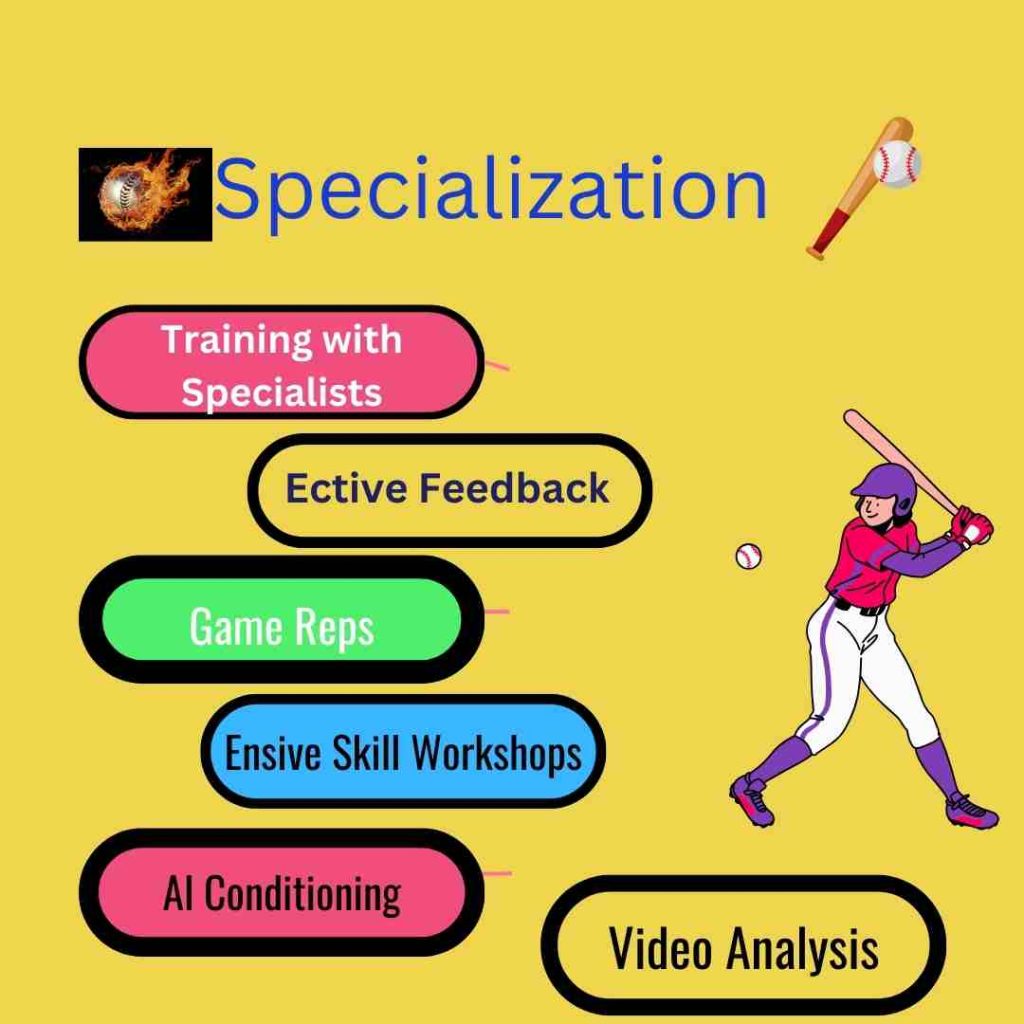
Many individuals love playing Baseball because they can train and play at any time of year. Baseball plays a significant role in local culture. Children play in their backyards for fun, on teams, and even in leagues. Children begin playing Baseball at a very young age, sometimes even before they begin school. Nevertheless, youngsters who start later can still excel in Baseball if they have coaching, practice opportunities, and support.
So, How Late is Too Late to Start Baseball?
Age Consideration
An athlete’s age has a significant impact on their experiences and possibilities during their career. Some great players have succeeded in defying expectations, but late starters may need help to catch up to their contemporaries who started practicing earlier. Examining these age-related factors provides light on baseball skill development, perseverance, and the road to success.
1- Difficulty Escalation After Age 12:
Although there isn’t a set age at which to begin playing Baseball, obstacles usually get more difficult for athletes who need to improve after age 12. Playing Baseball could be getting harder for younger players who still need to develop their skills to catch up to their more experienced counterparts who have been working hard for years.
2- Inspirational Examples:
It can be quite motivating to read about well-known baseball players who began playing Baseball later in life, especially for people who may have begun later in life themselves. The accomplishments of these players show that, despite potential difficulties, starting late in playing Baseball does not always spell doom.
| FAMOUS PLAYERS | STARTED AGE |
| Dee Gordon | 15 |
| Lorenzo Cain | 16 |
| Jackie Robinson | 15 |
| Kenneth Scott Rogers | 17 |
| Patrick Corbin | 16 |
- Dee Gordon:
Although he started playing Baseball later than most, Dee Gordon’s success was largely attributed to his natural talent and perseverance. Although there are differences in the precise age at which he started playing Baseball, his narrative highlights the importance of perseverance and hard work in accomplishing one’s objectives.
- Lorenzo Cain:
As an example of the possibility for late bloomers in sports, consider the fact that Cain’s rise to baseball stardom began later in life. Cain’s relentless commitment and skill allowed him to thrive on the field despite his delayed start, making significant contributions to the game.
- Jackie Robinson:
Jackie Robinson made history at 28 years old by breaking the color barrier in MLB. by entering the game later than others. Robinson’s story serves as a powerful illustration of bravery and resilience, showing that having a late start in Baseball does not have to be a barrier to achievement.
- Kenneth Scott Rogers:
A.K.A. Kenny Rogers, born Kenneth Scott Rogers, rose to prominence in Baseball despite starting his profession later in life. Rogers overcame adversity and became a powerful presence on the field, thanks to his skill and tenacity.
- Patrick Corbin:
Driven by his skill and unwavering commitment, Patrick Corbin’s baseball adventure picked up steam later in high school. Corbin’s story emphasizes the value of self-motivation and tenacity in achieving goals, even if one started their baseball career later than their peers.
Methods for Making Up Ground
In Baseball, How late is too late to start baseball? late starters might use targeted tactics to advance more quickly. Focusing on a particular position, such as pitching or catching, increases impact, and working with experts in training provides individualized advice.
Prioritizing playing time in gaming scenarios promotes the development of practical skills, while objective Feedback facilitates skill assessment. These tactics enable those who join the sport later to progress quickly and achieve success.
Emily Summers
1- Specialization:
Those who are new to Baseball may want to consider concentrating on being proficient at a single position, such as pitching or catching. Players can set themselves apart and increase their possible effect on the pitch by developing their talents in a particular role. Despite a late start in the sport, specialization increases the likelihood of success by allowing for targeted training and development in important areas.
2- Training with Specialists:
For late starts trying to make up ground in Baseball, seeking out extra instruction from professional or collegiate players can yield priceless insights and advice. Specialized training facilities give players the chance to learn from seasoned professionals who can offer individualized guidance and Feedback based on the player’s needs. Working with experts in training can hasten the development of skills and improve overall performance in the sector.
3- Objective Feedback:
In order for latecomers to accurately judge their skills, they must obtain evaluations from seasoned instructors or athletes. Accurate Feedback directs players on their development path by pointing out areas of strength and progress. Training priorities and techniques for skill growth can be informed by constructive Feedback from knowledgeable individuals, whether through official evaluations or informal assessments.
4- Game Reps:
Stressing the value of playing time is essential for improving skills and adjusting to changing game conditions. It is imperative for late starters to seize the chance to engage in game situations in order to hone their abilities and obtain invaluable field experience. Finding clubs or competitions where playing time is available on a proactive basis guarantees regular chances for talent development and application.

5- Intensive Skill Workshops:
Participating in camps or workshops designed especially for late starters can offer focused training and instruction to advance game knowledge and foundations quickly.
6- Mental Conditioning:
By using mental conditioning strategies like goal-setting, mindfulness, and visualization, late starters can improve their performance by gaining resilience, confidence, and focus on the field.
7- Video Analysis:
By using tools for reviewing and analyzing gameplay films, latecomers can precisely hone their skills by learning about their specific strengths, limitations, and places for progress.
Other Considerations:
Beyond the development of skills, a player’s performance and entire baseball experience are greatly influenced by a number of things. Achieving success and staying in the sport requires an understanding of and attention to these aspects.
1- Athleticism and Coordination in Playing Baseball:
To succeed, players must possess all three of these abilities. Athletes who want to succeed in the game need to be quick, strong, and agile in everything from pitching and fielding to hitting and base running. Perfect timing, as well as highly developed hand-eye coordination, are essential for making precise throws, connecting with pitches, and responding quickly to plays on the field.
2- Benefits of Early Exposure and Ongoing Practice in Travel Baseball
Participating in travel baseball programs and being exposed to Baseball at a young age have major benefits for player development. Players can compete against elite opponents, receive specialized coaching, and meet scouts and college recruiters by participating in travel baseball.
Players can improve their overall performance and potential for baseball progress by practicing consistently and participating in competitive tournaments. This helps players develop their abilities, confidence, and better understanding of the game.
3- Acknowledgment of Burnout Risk Among Kids in Year-Round Programs:
Year-round baseball programs present a risk of burnout for young athletes despite providing chances for skill development and competitive play. The rigorous schedules and tremendous pressure to succeed can wear one out physically and mentally, which lessens one’s love and enthusiasm for the sport.
Organizations, coaches, and parents must identify burnout symptoms and give young athletes’ well-being a priority. To prevent burnout and ensure long-term participation and enjoyment in Baseball, it is imperative to promote relaxation and recovery, encourage a balanced approach to training, and provide a friendly and happy environment.
Beginning Late in High School:
There’s nothing wrong with starting to start playing Baseball late and to optimize the chances of development and achievement in the sport, there are certain factors to take into account for students who start playing Baseball later in high school.
1- Attend Smaller High Schools:
Late starters might find it advantageous to think about attending smaller high schools, where there might be less competition for playing time. Fewer athletes compete for spots on smaller schools’ sports teams, giving latecomers more chances to show off their abilities and get crucial playing time.
2- Play Time Significance in Baseball:
Playing time is essential for the development of baseball skills and muscle memory, particularly for late starters. Players can practice their talents in real-time scenarios through regular game experience, which helps them refine their skills and gain confidence in the field. For latecomers to advance and prosper in Baseball, they must prioritize playing time, whether it is through summer league play or game repetitions in high school competitions.
3- Commitment and Dedication:
Late starters need to have a strong sense of dedication and commitment to their baseball training and growth. Regaining ground on classmates who may have started earlier requires consistent practice, tenacity, and a strong work ethic.
4- Persistence and Patience:
In Baseball, especially for late starters, progress can take some time. As improvement frequently occurs gradually with constant effort and practice, Patience and tenacity are essential traits to keep throughout the learning process.
Suggested Roles for Individuals with Late Starts:
Baseball late starters might find it helpful to concentrate on positions that provide room for talent improvement and game-changing potential. Pitching is a skill-based position with plenty of options for specialized instruction, which makes it a good choice for late starters. Regardless of when they first pick up the game, pitchers can achieve success with committed training and instruction.
A team’s effectiveness can be greatly enhanced by a pitcher’s ability to succeed on the mound and utilize various pitching grips and delivery mechanics.
Emily Summers
Beginning at Various Ages:
Guidance is necessary for people who begin Baseball at the ages of 13 or 16 in order to successfully manage the opportunities and obstacles of starting the sport later. In order to acquire fundamental skills and game experience, late starters (those who start at age 13) could find it helpful to join middle school teams or local leisure leagues. Developing special abilities like quickness, agility, or a powerful throwing arm can also make late players stand out and benefit their teams.
Conclusion
In conclusion, have a genuine love for the game and realistic expectations if you’re a late starter in Baseball. Year-round programs and early specialization can present difficulties, but motivated people can still succeed and enjoy themselves. Regardless of the result, concentrate on development, progress, and enjoying the trip.
FAQS
No, It’s always possible to start playing Baseball.
Children can typically begin playing T-ball when they are 4 or 5 years old.
The upper bound for playing competitively and forming a competitive team, such as a high school squad, is probably around 12.
Playing Baseball at a young age can be challenging.
Only a small percentage of high school and college players make it to the major leagues.
